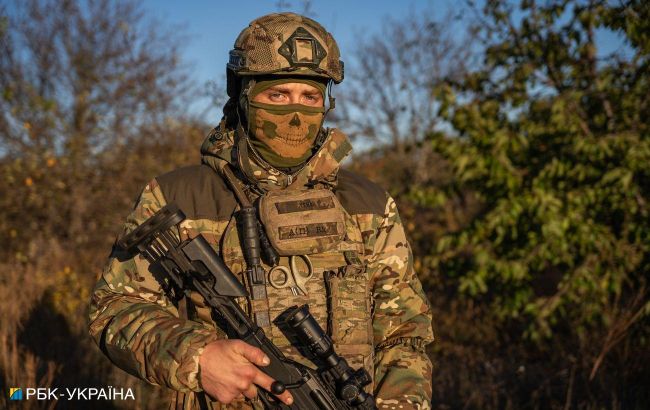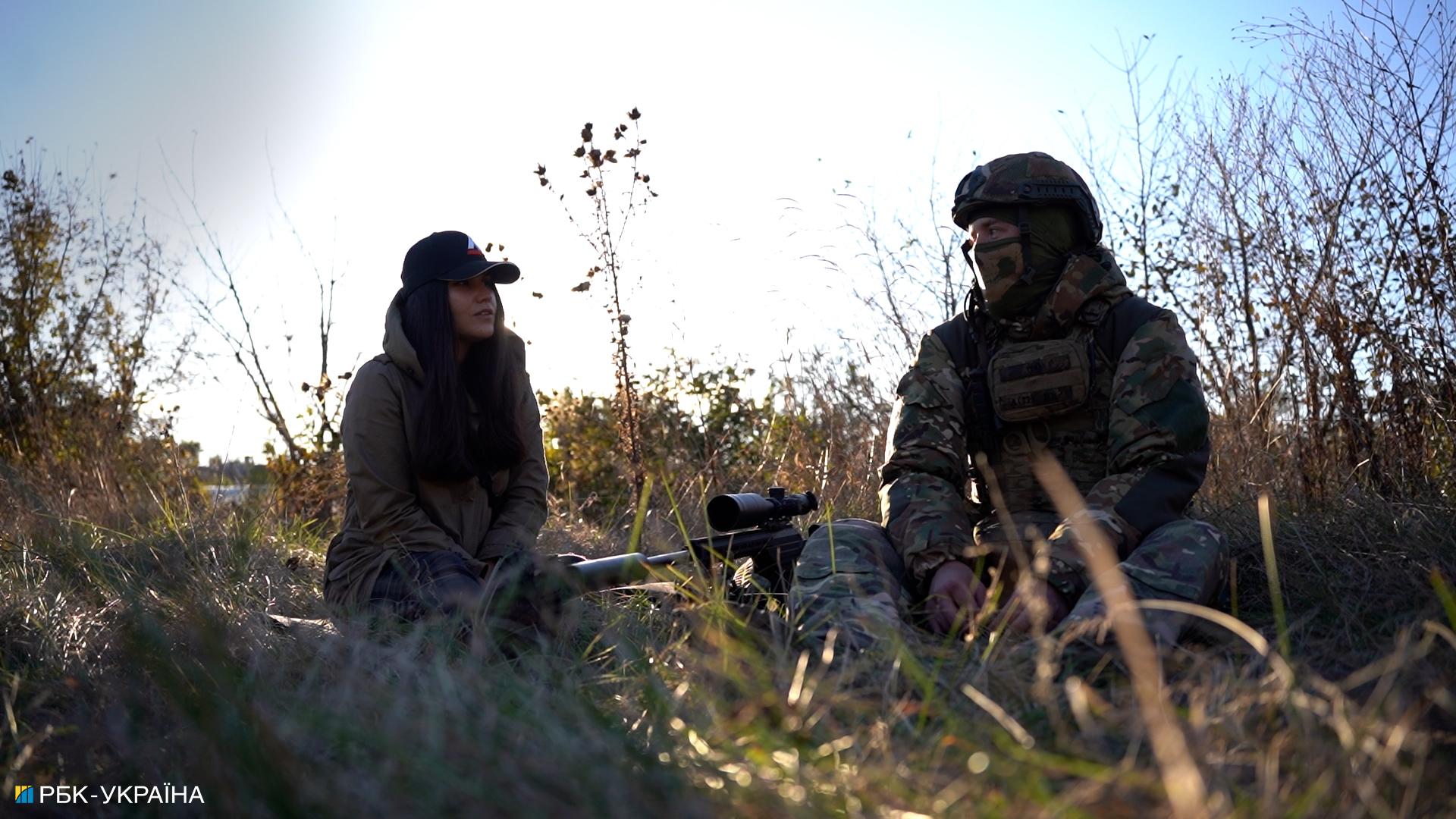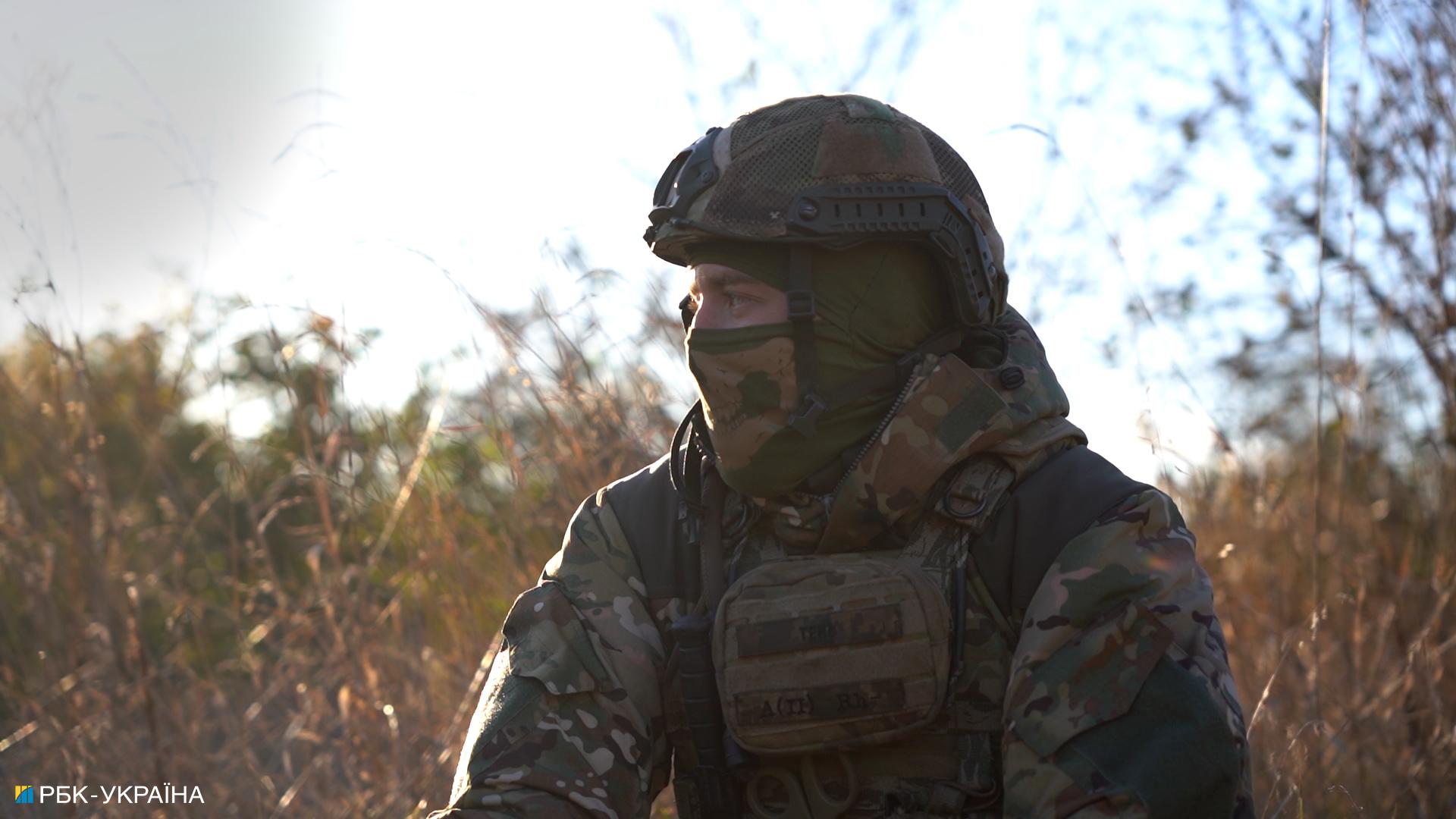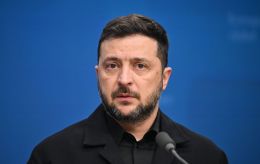'Shadow' sniper: Putin's priority is Bakhmut, while Russians drop like flies there
 Sniper "Shadow" (Photo: RBC-Ukraine)
Sniper "Shadow" (Photo: RBC-Ukraine)
In an interview with RBC-Ukraine, a sniper with the callsign "Shadow" (Tien in Ukrainian - ed.) from the 77th Airborne Brigade shared his experiences of the devastated city of Bakhmut, enemy snipers, and Russian soldiers being sent as cannon fodder by their commanders to Ukrainian positions.
Last winter, Ukrainian forces defended Bakhmut, a city that became a focal point for the Russian army after the withdrawal of Defense Forces from Soledar in late January 2023. Currently, Ukrainian forces are on the offensive in this direction, with the Russians entrenched in defense. Sniper "Shadow," along with his team, is operating in this challenging environment, where their work is precise and diverse, ranging from engaging the enemy directly to artillery targeting. The sniper has faced enemy fire repeatedly, including recent encounters with Russian kamikaze drones. He shared insights on the situation in Bakhmut and his experiences with RBC-Ukraine.
Becoming a sniper
I joined the 77th Airborne Brigade about six months ago. My proficiency in shooting during training exercises led to his transfer to the sniper unit. Before military service, I worked as a construction worker, primarily building roofs for houses. However, my last project was in Irpin, but it was not completed because the city was attacked by Russians. I lost my job and then decided to voluntarily join the army.
I am now in Bakmut. The situation here remains complex, with constant engagements from both Ukrainian and Russian forces. Losses have been incurred on both sides, but the Russians have definitely suffered more.
Sniper tasks
Snipers perform various tasks, including artillery adjustment and direct engagement with the enemy. They may also be involved in evacuating wounded soldiers, but only Ukrainians of course. We are doing our job, no one interferes with us.
As soon as the enemy notices us, they start "escorting" us, then enemy artillery, machine guns, and snipers start firing. We see and hear the direction from which they are shooting. And we start responding. Sometimes we do it ourselves, other times it involves coordinating artillery.

Responding to being detected by enemy
We were often detected. In such a case, you need to look for a nearby shelter. To sit out for a while. Or lay low to evade detection. That way they can lose the trail. You can't do much with chaotic running. So it is better to hide and wait, and then retaliate.
When snipers are detected, the enemy typically responds with everything from VOGs to GRADs. We recently suffered one loss during such shelling. A group was leaving and was spotted by a drone. They could not go far and got subjected to enemy artillery fire.
Sniper shots effectiveness
We coordinate artillery. They shell the area, and there are results. We also engage, but the idea is not to massively fire, that's not our approach.
We observe, select our target, watch, and wait. We determine the size of the territory, adjust our optics, and start working. We typically focus on live targets, while for vehicles, we work more on providing artillery guidance.
Drones don't fly when it's raining, so it makes our work easier. However, the enemy has predetermined points they've already targeted, and they randomly bombard those areas to keep us on our toes. For example, when we follow a route, they already know it, and they simply start shelling us.
Snipers have multiple positions: two to three temporary ones and one permanent. The permanent position is difficult to discern, and it's a place where you can wait out any bombardment. The temporary positions involve going in, taking a few shots, and leaving, with no intention to return.
Snipers' working conditions
It depends. We have faced so much, and we got through everything. It's getting colder, but we don't really care. The wind affects the bullet, that's true, but it does not really affect us.
It's easier without a ghillie suit (sniper camouflage - ed.), because when a drone operator sees a sniper coming, he starts shooting him. But they don't usually make much effort when you walk wearing camouflage like a regular shooter. So it's better to put on the ghillie suit when you reach the position.
As a rule, we arrive by car and then walk from there. We walked 6-7 kilometers at most. Sometimes a sniper lies in position for half a day to wait for a target.
We were once lying for 8 hours. Then we were waiting for their rotation. And we needed to know the trajectory they were following. At that time, we did not know where and how they were moving, because they were doing it covertly. So we had to catch the target. And we succeeded in the end.

Sniper's characteristics
To be an effective sniper, one must possess endurance, patience, good health, and knowledge of mathematics and geography. Calculations involving enemy positions, equipment, and counting are crucial, and they need to be done quickly to maintain an element of surprise.
You "hit" the point and pass the coordinates to the artillery, and it targets the equipment or the target that you cannot reach, depending on a situation.
Russian snipers
Based on my experience, I can say that their shooting is of poor quality. There was a moment when we had to reach a position. There was a section of the road being shot at by a sniper. And the Russian sniper was so "good" that he didn't even hit anyone. He tried to shoot each of us 2-3 times, but no one was hit. We went in and came out unscathed.
There was an incident where a Russian sniper was working, and the infantry soldiers got scared. But we understood that the bullets were flying over our heads, and he was working to scare our soldiers so they wouldn't continue their advance. Then their drone operator would spot us and start attacking our soldiers. When the guys resumed their movement, their sniper would start working again to keep them on edge. But he didn't make any accurate shots at all.
However, Russian snipers are not easy to predict. We dealt with one of such. He changed positions five times in two days, all within a two-kilometer radius. He would make 1-2 shots and disappear for the day. We tried to figure out the directions from which he was shooting, selected similar positions from which we would have taken shots, and took those places into account. But it didn't work out. We spent several days watching, and then the mission changed.
Bakhmut and enemy tactics
The tactics employed by Russian forces in Bakhmut have remained consistent. They keep throwing cannon fodder at us. Interestingly enough, there's a lot of their cannon fodder on the Bakhmut direction, but much fewer vehicles are arriving. There are combat engagements and assaults every single day, with Russians dropping like flies as a result.
Our forces are holding their ground. It's challenging to advance on the Bakhmut direction though, as the trenches are filled with Russians. The city of Bakhmut is in ruins, and the Russians have dug trenches even within the city limits. That's what we should've done at some point, too.
Right now, they've taken a defensive stance. I don't know why they won't let go of this city. Putin's priority is that it becomes theirs. But they are dying here massively. We'll reclaim the city, but it's a skeleton upon a skeleton. Ruins and bodies everywhere.
The morale among Ukrainian soldiers remains the same - to kill as many Russians as possible. And we will do just that.

